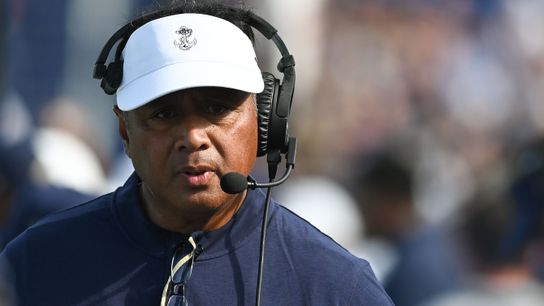I'm of two minds when it comes to the College Football Playoff selection committee. Sometimes I'd love for the Powers That Be to kick all the humans out of the room and go to a BCS-style selection criteria comprised only of an agreed upon set of metrics like the Sagarin poll, including newer ones like SP+, FEI and the like. No human creation will ever be without human biases, but at least we'll know these biases going in and they won't change depending on who's in the room.
That's unlikely to happen, though. And since the humans are staying in the room, I think we don't have the right biases in the room.
The College Football Playoff on Wednesday announced three new members of its 13-member selection committee. Washington AD Jen Cohen will replace Colorado AD Rick George; Miami (Ohio) AD David Sayler will replace Wyoming AD Tom Burman; and former Nevada head coach Chris Ault will replace former Penn State and Baltimore Ravens offensive lineman John Urschel. I'm sure Cohen, Sayler and Ault will do a fine job, but that's not the point.
The selection committee has been made up of the same types of people for its entire 10-year (yep, 2023 will be the 10th year of this system) history. The 2023 committee will consist of eight active ADs, two retired coaches, one business leader, one ex-NFL player, and one ex-media member.
One group is conspicuously absent: ball coaches. Not to insult Chris Ault or returning member Jim Grobe -- glad to have both of you here -- but I'm talking about mid-career coaches who have lived and breathed the game for the past 15 years that just so happen to be out of the game for a season.
I'm talking about former Georgia Tech head coach Geoff Collins, who has worked in college football more or less every day since 1996; Ken Niumatalolo, the former Navy head coach who is currently without a college football team for the first time since 1986; Bill Clark, who'd still be the head coach at UAB if not for back problems; David Shaw, one of the most respected voices in the game following a 12-year run as Stanford's head coach.
Of course, it wouldn't have to be those men specifically, or even former head coaches, but you get the point. The CFP board room should pull up a couple chairs for people who live and breathe this stuff on a daily basis.
As it stands today, the CFP selection committee process is fundamentally a silly exercise. Thirteen people spend their Mondays and Tuesdays for six straight weeks to spit out a Top 25 poll that basically means nothing, all before the actual set of rankings that just about anyone can do. In the 4-team system, most every season has a way of working its way out on the field; even in 2022, there was no real choice between Ohio State and a 2-loss Alabama that didn't even win its division. But that's about to change.
Starting in 2024, the selection process will have real responsibility, with real consequences. Not only will the group have to pick 12 teams, they'll have to award first round byes to four teams, to award home games to four more teams, and to select and rank their top six conference champions. Precious little daylight could separate No. 4 and No. 5, No. 8 and No. 9, No. 12 and No. 13. The gap between the sixth- and seventh-best conference champion might be tiny, but the stakes will be enormous. The 12-team Playoff will likely make it even more difficult for anyone other than Georgia and Alabama to actually win the national championship, but simply making the field will become the measuring stick for most every FBS team, starting in 2024.
There is an obvious question: Why would any sane coach want to subject themself to that?
That question, while valid, has two obvious solutions. For coaches with no desire to work again, it could be a way for them to give back to the game, and to keep themselves occupied for what would likely be the first fall away from the sideline since they were kids. For mid-career coaches looking to get back in, serving on the selection committee would have tremendous value. It would be a way to remain connected to the game, to stay top-of-mind for vacancies set to open that December, and an opportunity to return to coaching with in-depth knowledge of every Top 25 team. Not every qualified candidate would want the job, but enough would.
Again, I think a set of computers could do just as satisfactory/maddening of a job as humans. But as long as we're asking humans to complete this fundamentally thankless task, there's a real gap between people who are familiar with the game of college football and those who actually know ball.
